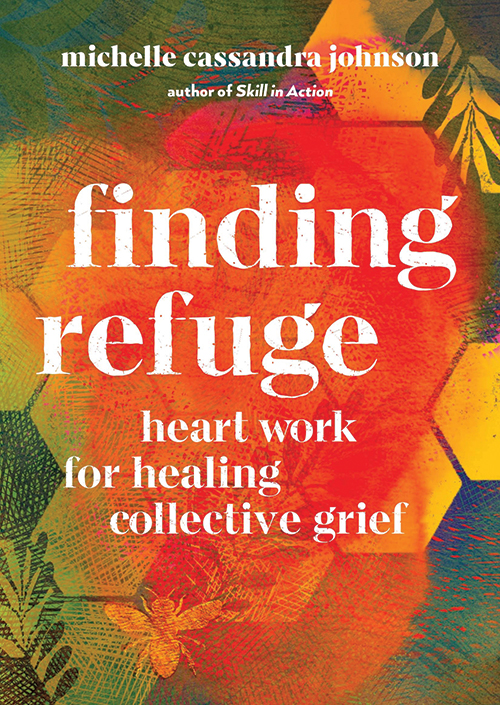
Finding Refuge: Heart Work for Healing Collective Grief
Reviewed by Brad Sheeks
January 1, 2022
By Michelle Cassandra Johnson. Shambhala Publications, 2021. 168 pages. $17.95/paperback; $13.99/eBook.
I’d guess there are Friends Journal readers who know of Michelle Cassandra Johnson, but let me introduce her to the rest of you. She is an African American woman from North Carolina who’s been leading antiracism training for over 20 years. A previously published author (Skill in Action, which is based on her training work), she works as a licensed clinical social worker and a yoga teacher. It was deeply significant to her that the release date of Finding Refuge: Heart Work for Healing Collective Grief was July 13, 2021, exactly eight years to the day after George Zimmerman was acquitted for the murder of Trayvon Martin. This is what happened on the night of July 13, 2013, when a friend called to tell her about the Zimmerman acquittal. She writes:
I fell to the floor upon reading the news. I don’t remember all the details—trauma doesn’t allow one to remember everything as it happens. I do remember the cold concrete floor, the sound of my wailing, and my heart, shattering in a way that felt irreparable. I felt dismembered, as if all the ancestral trauma of living in a Black body in a culture that doesn’t value Blackness came out through tears, snot, and screams.
This brings us to her central theme: the idea of collective damage and grieving suffered by an oppressed community. The blow of an upsetting experience lands harder and the damage is more severe when the incident triggers a particular legacy of racial discrimination. She cites two more experiences as examples. There was a pharmacy delay in delivering medication to her very ill mother. This delay triggered a cascade of anger when she thought of the legacy of neglect and mistreatment suffered by African Americans at the hands of the medical establishment. Think of the damage done by the Tuskegee Syphilis Study conducted between 1932 and 1972. People must think of it when they hesitate to get vaccinated for COVID-19 because they don’t trust the medical system. Another instance was when she was pulled over in a small town. The flashing lights stimulated a panic attack of fear associated with the legacy of police killings of African Americans. It hit me that Johnson was writing her book in 2020, the year that George Floyd was killed in Minneapolis, Minn., which reminded me that Breonna Taylor (2020); Walter Wallace Jr. (2020); Kenneth French (2019); Ronald Greene (2019); Stephon Clark (2018); Philando Castile (2016); Jamarion Robinson (2016); Alton Sterling (2016); Walter Scott (2015); Tamir Rice (2014); Michael Brown (2014); Eric Garner (2014); and Laquan McDonald (2014) were all killed by police.
Johnson’s outrage over the pharmacy delay of medicine for her mother and her panic when pulled over by the police seem like reactions consistent with post-traumatic stress disorder (PTSD), such as when a survivor of a house fire becomes frightened at the smell of a barbecue fire. PTSD reactions to ordinary noises are fairly common among returning veterans. Robert T. Carter, who taught at Columbia University, developed a model for understanding the traumatic response to an incident that calls to mind the legacy of racial discrimination. He called it race-based traumatic stress (RBTS), and outlined the different emotional responses individuals have following race-based encounters, including depression, anxiety, difficulty sleeping, and nightmares.
Where does one find refuge? Johnson starts her day with a spiritual practice that supports healing and is based on yoga teachings and wisdom. She uses guided meditations designed to bring her to such self-affirming statements as “I am whole. I am healing. We are whole. We are healing.” She has a special place in her home, a kind of altar, where she keeps artifacts that remind her of ancestral support.
Michelle Cassandra Johnson has a strong, self-affirming story for facing the pain of feeling helpless, confused, and powerless, as a result of damage done to People of Color by White supremacy. She is in good company with Resmaa Menakem (My Grandmother’s Hands), who, from the perspective of body-centered psychology, has written on the harm caused by racism in the United States.
Brad Sheeks is a member of Newtown (Pa.) Meeting. A retired co-leader (with Pat McBee) of the Friends General Conference Couple Enrichment Program, he is also retired from hospice nursing.


